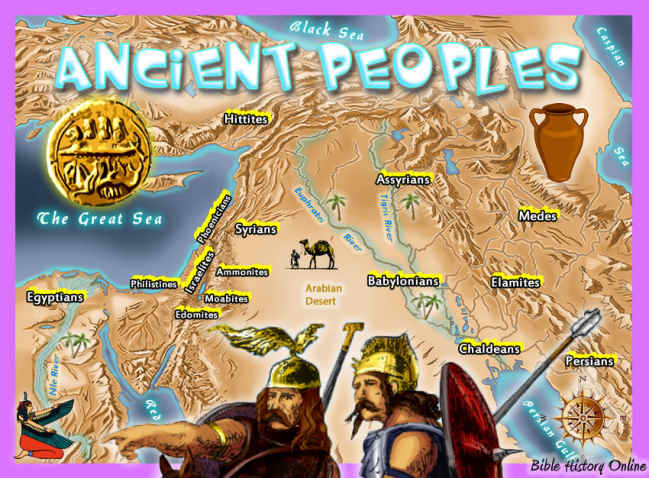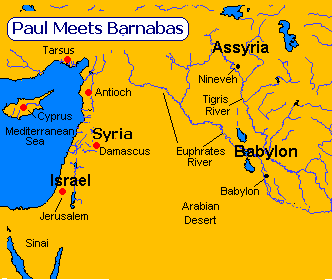+ Blue Letter Bible/KJV + 개역한글 성경구절

▶ 바울(Paul)
뜻 : 작은 자
(1) 출생과 교육 : 길리기아의 다소 출신으로 가말리엘 문하에서 율법의 엄한 교훈을 받았다. 열심있는 자이며(행22:3) 청결한 양심으로 선조때부터 섬기던 하나님을 섬기고(딤후01:3) 할례를 받았고 자랑할만한 베냐민 지파요 율법으로는 바리세인이요 열심으로는 교회의 선두에서 핍박하던 사람이니 바리세인의 입장에서 볼 때에는 도무지 결점이 없는 사람이었다(빌03:5-6). 조상의 유전에 대하여 더욱 열심이었다(갈01:14). 나면서 부터 로마의 시민권을 가졌다(행22:26-28).
(2) 성격:논리의 힘과 능력의 결합 즉 이성과 영력이 일치된 것이 특색이다. 결점이 있다면 너무 성급하여 후회하는 일이 있었던 점(행15:39, (행23:4-5). 자기 몸에 가시가 있다고 말한 것은 성격의 나무람 같다(고후12:7).
(3) 회개:기독인들이 율법을 경히 여기고 성전을 모독한다고 생각했었다(행06:31). 스데반 죽이는 일에 가담한 것은 의분심에서 였다(행07:5- (행04:3). 그 후 기독교인을 본격적으로 박해하기 위하여 다메섹으로 향하였다(행09:1-2). 다메섹 도상에서 그리스도의 음성을 듣고 회개하여 크리스챤이 되었다(행09:1, (행22:4, (행26:9).
(4) 선교활동:공중앞에서 회개한 사실을 간증하고 전환된 마음을 수습하고 앞날을 위한 준비로 아라비아에 은퇴하여 더욱 힘을 얻고 돌아와 유대 인에게 예수가 기다리던 그리스도임을 전파하였다(갈01:16-18), (행09:22).

* 1차 선교여행은 바나바와 같이 마가를 데리고 안디옥에서 출발하여 구브로섬을 경유 소아시아 중남부 지방의 유다인 회당을 순방하면서 거기를 발판으로 선교하였다. 이 선교 활동 중 이방인 회심자와 유대인의 율법과의 관계에 있어 문제가 야기되어 유대교의 전통을 고집하는 자들의 반대에 부딛쳐 이 문제 해결을 위하여 예루살렘에 올라가 예루살렘회의 때 이방인 선교에 관한 문제 협정을 지었다 (행13:4- (행14:28).
* 2차 선교여행은 실라를 데리고 안디옥을 출발하여 드로아 바다를 건너 유럽 땅에 들어가 마게도냐 지방의 빌립보 데살로니가 아덴 고린도에 이르러 1년 반 동안 머물렀다가 그 후에 에베소를 지나 예루살렘을 방문하고 안디옥으로 돌아왔다(행15:40- (행16: (행17: (행18:22).
* 3차 선교여행은 소아시아의 내륙지방 갈라디아 부르기아 지방을 지나 에베소에 도착하여 거기서 3년동안 머물러 있으면서 그 부근에서 선교하였다. 그 후 다시 유럽으로 건너가 마게도내에서 고린도로 가서 다시 예루살렘으로 갔다. 이 선교 여행에서 지중해 연안에 몇개의 교회가 설립되었고 신약성서에 편집된 성서 편지(바울서신)도 많이 썼다(행18:23- (행19: (행20: (행21:14).
* 3차 선교여행을 끝내고 예루살렘에 도착한 바울은 반대파인 율법주의 자들의 선동과 모략으로 입건되어 가이사랴에 2년간 감금을 당하였다. 그러나 그것이 인연이 되어 바울은 총독 벨렉스 베스도 그리고 아그립바왕 앞에서 자신을 변명할 기회를 얻게 되었다. 그 후 로마 황제 가이사에게 상소하여 지중해를 건너 로마로 갔다(행21:17- (행22: (행23 (행24:27).
(5) 인물:헬라 문화의 교육을 받았으며 로마의 시민권을 가지고 있었다. 지중해 연안에서 많은 박해를 받으면서 전도하였다(고후11:23-28). 복음의 진리에 대한 확신을 가지고 30년간 선교사로서 눈부신 활동을 하였다(고전09:10). 건강은 좋지 못했고 용모도 보잘것 없었다(고후10:10, (고후12:7).
========
Saul of Tarsus.
See PAUL.
========
Paul.
This apostle was of the tribe of Benjamin, a Hebrew of pure descent, born at Tarsus, a city of Cilicia, a fact which gave to him the privilege of Roman citizenship. He was a disciple of Gamaliel and a strict Pharisee. He is first introduced to us as a young man, by name SAUL, at whose feet the witnesses who stoned Stephen laid their clothes. He became afterwards a violent persecutor of the saints, both of men and women, acting with great zeal, thinking he was doing God's service. His conversion as the effect of the Lord appearing to him was unique, and he was so completely changed that he became at once as bold for Christ as before he had been a persecutor of Christ in the persons of His saints. He immediately preached in the synagogues that Jesus was the Son of God. This was the distinctive point of his testimony. As the Jews sought his life at Damascus, he departed into Arabia, where doubtless he had deep exercise of heart and learnt more of the Lord.
After three years he went up to see Peter at Jerusalem, where he spoke boldly in the name of the Lord Jesus. The Jews again seeking his life, he was conducted to Caesarea, and sent to Tarsus, his native place. From thence he was fetched by Barnabas to go to Antioch, where the gospel had been effectual, and there they both laboured. After having, in company with Barnabas, taken supplies to Jerusalem (his second visit), on occasion of a dearth, he commenced his first missionary journey to Cyprus and Asia Minor. He and Barnabas returned to Antioch, where he remained 'a long time.' On a dispute arising as to Gentile converts being circumcised, he went with Barnabas to Jerusalem concerning that question, and returned to Antioch. This city had become a sort of centre of the activity of the Spirit. Being far from Jerusalem it was less influenced by Judaising tendencies, though communion with the saints there was maintained.
Asia Minor, Macedonia and Greece were the sphere of Paul's second missionary journey. Having differed from Barnabas, because the latter wished to take John with them (who had left them on the first journey), Paul selected Silas for his companion, and departed with the full fellowship of the brethren. During part of this journey Timothy was one of the company. He abode a year and a half at Corinth, where he wrote the two EPISTLES TO THE THESSALONIANS. He now visited Jerusalem at the feast, and returned to Antioch. He took his third missionary journey through Galatia and Phrygia. When he visited Ephesus he separated the disciples from the synagogue, and they met in the school of Tyrannus. At Ephesus he wrote the FIRST EPISTLE TO THE CORINTHIANS, and probably the EPISTLE TO THE GALATIANS. After the tumult raised by Demetrius he went to Macedonia, and there wrote the SECOND EPISTLE TO THE CORINTHIANS. He again visited Corinth and wrote the EPISTLE TO THE ROMANS.
The Jews seeking his life, Paul went through Macedonia, sailed from Philippi, and preached at Troas. At Miletus he gave a solemn parting address to the elders of Ephesus, and took his leave of the disciples at Tyre, where he was cautioned not to go to Jerusalem. At Caesarea also he was warned of what awaited him at Jerusalem, but he avowed that he was ready not only to be bound, but also to die for the name of the Lord Jesus.
Paul arrived at Jerusalem just before Pentecost. In order to prove himself a good Jew he was advised by the brethren to associate himself with four men who had a vow on them, and to be at charges with them. But while carrying this out he was seized by some Asiatic Jews, and beaten, but was rescued by Lysias, the Roman chief captain. After appearing before the council, and again being rescued by him, he was for safety sent off by night to Caesarea. There his cause was heard by Felix, who kept him prisoner, hoping to be bribed to release him. Two years later, when superseded by Festus, Felix, to please the Jews, left Paul in bonds. On appearing before Festus, to save himself from being sent to Jerusalem, there being a plot to waylay and murder him, Paul appealed to the emperor. His case having been heard by Agrippa and Festus, he was finally remitted to Rome. The ship, however, was wrecked at Malta, where they wintered, all on board having been saved.
On his arrival at Rome, Paul sent for the chief men of the Jews and preached to them: some of them believed, though the majority rejected God's grace (thus fulfilling Isa. 6:9, 10), which should henceforth go to the Gentiles. He, though still a prisoner, abode two years in his own hired house. There he wrote the EPISTLES TO THE COLOSSIANS, the EPHESIANS, the PHILIPPIANS, and also to PHILEMON.
The history of Paul is thus far given in the Acts of the Apostles, but there are intimations in the later epistles that after the two years at Rome he was liberated. His movements from that time are not definitely recorded; apparently he visited Ephesus and Macedonia, 1 Tim. 1:3; wrote the FIRST EPISTLE TO TIMOTHY; visited Crete, Titus 1:5; and Nicopolis, Titus 3:12; wrote the EPISTLE TO TITUS (the early writers say that he went to Spain, which we know he desired to do, Rom. 15:24, 28); visited Troas and Miletus, 2 Tim. 4:13, 20; wrote the EPISTLE TO THE HEBREWS; and when a prisoner at Rome the second time, wrote the SECOND EPISTLE TO TIMOTHY, when expecting his death. Early writers say that he was beheaded with the sword, which is probable, as he was a Roman citizen.
Paul received his commission directly from Christ who appeared to him in glory, and this source of his apostleship he carefully insists on in the Epistle to the Galatians. New light as to the church in its heavenly character came out by Paul, who was God's special apostle for that purpose. To him was revealed the truth that the assembly was the body of Christ, and the doctrine of new creation in Christ Jesus, in which evidently there is no distinction between Jew and Gentile. This caused great persecution from the Jews and from Judaising teachers, who could not readily give up the law, nor endure the thought of Gentiles having an equal place with themselves. This Paul insisted on: it was his mission as apostle to the Gentiles. To Paul also was committed what he calls "my gospel:" this was 'the gospel of the glory' (Christ in glory who put away the Christian's sins being presented in it as the last Adam, the Son of God). 2 Cor. 4:4. It not only brings salvation, great as that is, but it separates the believer from earth, and conforms him to Christ as He is in glory.
Paul was an eminent and faithful servant of Christ. As such he was content to be nothing, that Christ might be glorified. To the Thessalonians he was gentle 'as a nurse cherisheth her children.' 1 Thess. 2:7. He was severe however to the Corinthians when they were allowing sin in their midst, and to them he had to assert his apostolic authority when traducers were seeking to nullify his influence among them. To the Galatians he was still more severe: they were in danger of being shipwrecked as to faith by false Judaising teachers, who were undermining the truth of the gospel.
In the epistles we get a few glimpses of the inner life of Paul. After having been caught up into the third heavens, he prayed for the removal of the thorn in the flesh which had been given him lest he should be puffed up, and was told that Christ's grace was sufficient for him, he could say, "most gladly therefore will I rather glory in my infirmities, that the power of Christ may rest upon me. Therefore I take pleasure in infirmities, in reproaches, in necessities, in persecutions, in distresses for Christ's sake: for when I am weak, then am I strong.'' 2 Cor. 12:9, 10. He also could say, "To me to live is Christ;" and "This one thing I do, forgetting those things which are behind, and reaching forth unto those things which are before, I press toward the mark for the prize of the calling on high of God in Christ Jesus." Phil. 3:13, 14. As a martyr he reached that goal. The catalogue he gives of his privations and sufferings in 2 Cor. 11:23-28 discloses the fact that but a small part of his gigantic labours is recounted in the Acts of the Apostles.
--- Morrish Bible Dictionary
개역한글KHRV( 120일1독, 1년1독, 권별, 성경통독 )
STUDY - 구절(WESLEY), 단락(MATTHEW), 읽기(Wayne),
Dictionary - Chapter, OT구약, NT신약, 테마별,
|
1창세기[Genesis] 2출애굽기[Exodus] 3레위기[Leviticus] 4민수기[Numbers] 5신명기[Deuteronomy] 6여호수아[Joshua] 7사사기[Judges] 8룻기[Ruth] 9사무엘상[I Samuel] 10사무엘하[II Samuel] 11열왕기상[I Kings] 12열왕기하[II Kings] 13역대상[I Chronicles] 14역대하[II Chronicles] 15에스라[Ezra] 16느헤미아[Nehemiah] 17에스더[Esther] 18욥기[Job] 19시편[Psalms] 20잠언[Proverbs] 21전도서[Ecclesiastes] 22아가[Song of Solomon] 23이사야[Isaiah] 24예레미야[Jeremiah] 5예레미아애가[Lamentations] 26에스겔[Ezekiel] 27다니엘[Daniel] 28호세아[Hosea] 29요엘[Joel] 30아모스[Amos] 31오바댜[Obadiah] 32요나[Jonah] 33미가[Micah] 34나훔[Nahum] 35하박국[Habakkuk] 36스바냐[Zephaniah] 37학개[Haggai] 38스가랴[Zechariah] 39말라기[Malachi] 40마태복음[Matthew] 41마가복음[Mark] 42누가복음[Luke] 43요한복음[John] 44사도행전[Acts] 45로마서[Romans] 46고린도전서[I Corinthians] 47고린도후서[II Corinthians] 48갈라디아서[Galatians] 49에베소서[Ephesians] 50빌립보서[Philippians] 51골로새서[Colossians] 52데살로니가전서[I Thessalonian] 53데살로니가후서[2 Thessalonian] 54디모데전서[I Timothy] 55디모데후서[II Timothy] 56디도서[Titus] 57빌레몬서[Philemon] 58히브리서[Hebrews] 59야고보서[James] 60베드로전서[I Peter] 61베드로후서[II Peter] 62요한일서[I John] 63요한이서[II John] 64요한삼서[III John] 65유다서[Jude] 66요한계시록[Revelation]

 , 성경권별
, 성경권별 

